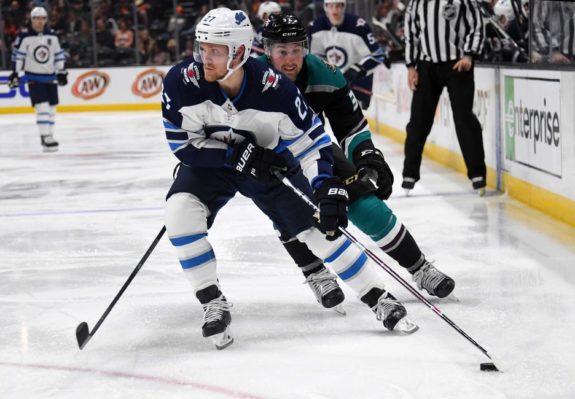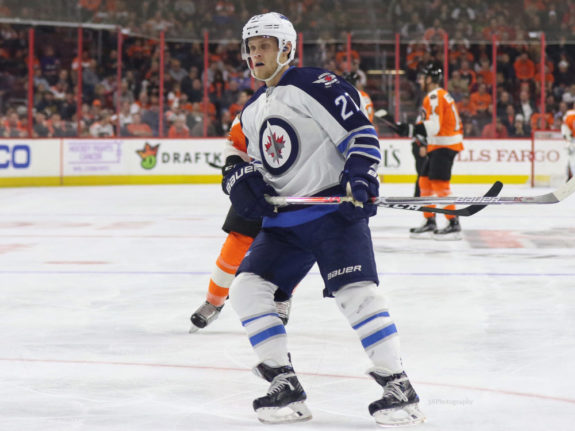In hindsight, the Winnipeg Jets lucked out when they selected Nikolaj Ehlers ninth overall in the 2014 NHL draft. Only five players from his draft have outscored him, with all of them doing so in more games played.
Ehlers is an ultra-skilled, speedy, crafty, scoring winger. He is 23-years-old and is coming off his third consecutive 20-goal campaign. He is on an extremely team-friendly contract with term and cost certainty and has proven he plays well with the Jets best line.
So, should the Jets trade this player? If you answered yes to this question, you have unfortunately missed your chance to be part of former general manager Peter Chiarelli’s management team with the Edmonton Oilers.

Yet those who believe Ehlers should be traded seem to grow in number every day. There were some trade grumblings among Winnipeg fans after his goalless playoff outing, but now the rumors are coming from trusted sources like TSN’s Frank Seravalli. And they’re increasingly direct. The Jets are actively shopping Ehlers.
If that’s true, the team has had a baffling start to the week of the draft. From what appears to be a lopsided Jacob Trouba trade, to aggressively shopping one of their brightest young stars, it’s not been an easy week for Jets fans.
Yet, with the team facing a cap crunch on the horizon and Ehlers making $6 million for another five seasons, an increasing number of voices are adding to the cry to trade him, while still more pundits are saying he is on the block. For a wide variety of reasons, this would be a mistake for the Jets.
Ehlers the Perfect Complementary Winger
It’s true Ehlers didn’t have as strong of a season offensively in 2018-19 as he did the two seasons prior. Actually, this is all the more reason not to trade him at the moment (more on that later). Yet, even in what must be called a down season, he still posted 21 goals.
In the past, Ehlers has done his best work with linemates Blake Wheeler and Mark Scheifele. When he’s been on that line, they’ve clicked. Both Ehlers and the duo of Scheifele and Wheeler have been better for it.
What’s more, Ehlers’s good buddy Patrik Laine has been better for it too. In an entire season worth of highlight reels for both players, one thing stands out: neither one assisted on a goal by the other at any point in the regular season. In fact, they were only even on the ice together for one goal out of their combined 51. Not everyone is a proponent of advanced statistics, but those stats are about as unadvanced as you can get, and they paint a very clear picture.
Ehlers’ usage could be the subject of another entirely separate article but the point is this: even while playing much of the season with a linemate he simply didn’t work well with, Ehlers managed 21 goals. When he was with his usual linemates, the Jets as a whole were better for it.
Used properly, Ehlers is a 30-goal winger. Of this, I have no doubt. How many 30-goal scorers at age 23 are on a long-term, comparatively low-cost contract?

Ehlers drives the play, forces defensemen back on their heels with his speed like few other players in the game, moves laterally better than all but a handful of NHL forwards, and draws more penalties than almost any other NHLer. His overlying numbers paint a strong enough picture, but it’s the things he does that don’t always end up on the scoresheet that show him for the elite pace-setter he is.
Ehlers Trade the Wrong Answer
The Jets are facing a cap crunch and a sudden lack of depth on the right side on defense. Both are problems that deserve solutions, but trading Ehlers is the wrong answer to the right question.
If cap space is really what the Jets crave, is it truly in their best interest to deal away a player with a cost-effective contract set for five more seasons? Surely there are other ways for the Jets to cut costs. Dmitry Kulikov’s contract springs to mind.
Asset management is part of winning a championship in the salary cap era. Just look at the Chicago Blackhawks, who were frequently forced to offload massive parts of championship winning teams. Yet, because they shipped off the right assets, they kept on winning for a long time.

What’s more, trading Ehlers now would be a sure fire way to get a bad return. While the playoffs are a small sample size, and plenty of other forwards have struggled early in their playoff careers (Pavel Datsyuk among them), Ehlers lack of production in the postseason makes him a sell-low candidate. Returning to the Oilers, ask them how selling low on Jordan Eberle worked out for them.
It’s easy to get down on a player, and a team for that matter, quickly. The Jets were supposed to be better this season. They fell well short of lofty expectations. The temptation, for both fans and management, must be to make changes.
Changes are certainly coming to the Jets. Some already have, though perhaps not for the better. It would be hard, if not impossible, to win a trade involving Ehlers. The Jets would be better served to change nothing rather than losing a play-driving, highly-skilled young forward under a great contract to a knee-jerk reaction after one poor season.